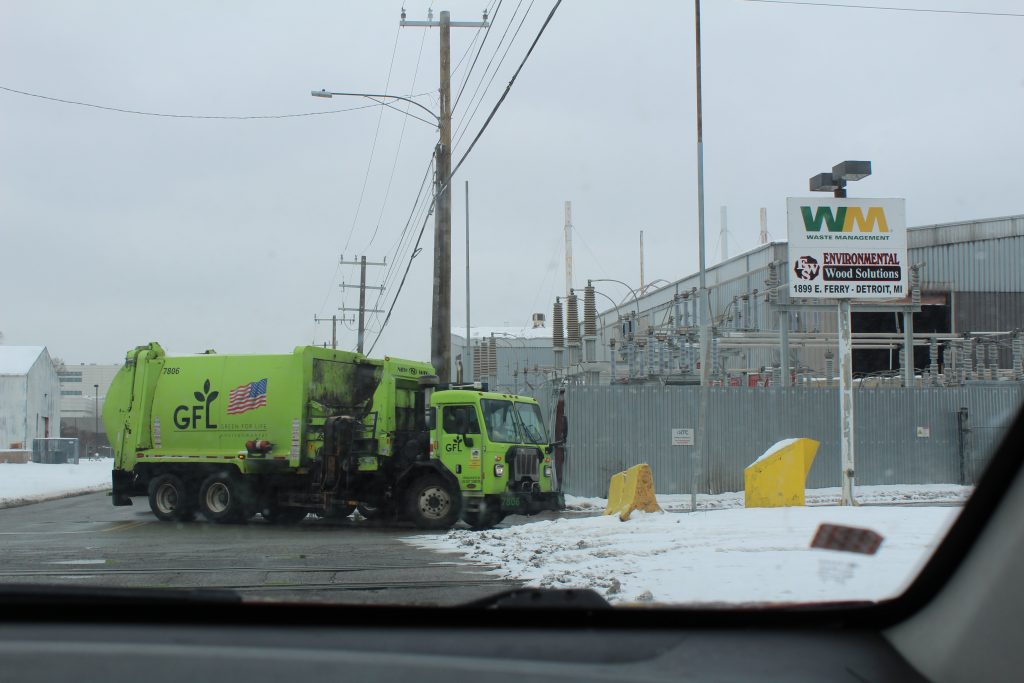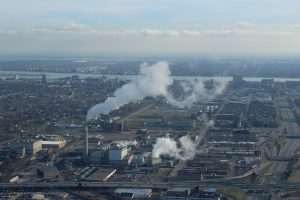Community upset over proposed Detroit recycling hub
The facility would be located next to the site of the former Detroit incinerator, a trash-burning plant shut down in 2019.

A truck pulls into the Ferry Street entrance of WM's transfer station. This is the proposed sight of the new recycling hub.
The company Waste Management is planning to build a recycling hub at a site where it currently transfers waste in Detroit. But environmental advocates have questions, and members of the nearby community say they don’t want to see the facility open. They’re still reeling from decades of living near a trash burning plant.
Detroit’s former incinerator
In Detroit, just south of I-94, there’s an industrial area squeezed between the cultural center and residential neighborhoods. This is where the Detroit incinerator used to burn trash.
“And you can see the main stack is still standing,” says Melissa Cooper Sargent, an environmental health advocate with the Detroit Ecology Center. She also lives nearby.
Cooper Sargent gestures toward a tall industrial chimney that towers above the incinerator.
“It’s designed that way so that as they release the pollutants, they’re supposed to go high up in the air and not settle within the neighborhood, although it does,” she says.
The trash burning facility – which was last run by Detroit Renewable Power – shut down in 2019. The incinerator was a source of ire for area residents for decades. Cooper Sargent says environmental advocates were gearing up to sue Detroit Renewable Power for violating the Clean Air Act when the company suddenly announced it would shut down the incinerator.

While this was a huge victory for opponents, Cooper Sargent says the damage had already been done.
“We were breathing in tiny particles of trash. It gets into the lungs. It gets into the bloodstream. It’s not simply just gone,” she says. “The memory is very fresh. And so that feeling of being dumped on and being on the receiving end of this state’s trash and out-of-state trash is real.”
New recycling hub proposed by WM in Detroit
Now, feet away from the shuttered facility, a company called Waste Management is planning to open a major recycling center on a parcel that it currently owns and operates as a place to transfer trash. WM says new the recycling plant would be high-tech, using scanners and robotic arms to intelligently sort materials that it would bring in from across the state.
Locations of the old incinerator and the new recycling hub.
“This is more of a regional plan for us,” Tracy Winston, the Director of Government affairs for WM said at a virtual community meeting that her company held back in January for environmentalists and residents who live and work near the facility. “We have what is called a hub and spoke model. We are making Detroit the center, the hub of our sustainability and recycling infrastructure within the state of Michigan.”
The attendees have a lot of questions and concerns.
“How many trucks will be coming into this facility on a daily basis? And will those be diesel trucks?” asks Detroit-based activist Kim Hunter.
Winston answers that the number of trucks will depend on how much business the facility ends up getting. As for the diesel question, she says WM’s vehicles pollute less than typical trucks.
“Most of our trucks are RNG CNG, which means that they use renewable natural gas, compressed natural gas, which has a much smaller footprint than a diesel truck,” Winston replies. “We have that kind of technology already in the state of Michigan that we use for our trucks and we’re really proud of that.”
Residents and activists say they’re also concerned about the weight of the trucks on pavement and about their traffic patterns. The Joe Louis Greenway, a walking and biking path, is planned to pass through the area. Ferry Street, which is adjacent to the plant, is currently used as a bike thoroughfare.
Some community members and activists say they’re also worried that the plant will be used for chemical recycling, an emerging technology for processing difficult-to-recycle plastics that critics believe causes pollution.
Winston says she’s not aware of any plans for chemical recycling at this location.
“Keep in mind this is a recycling facility. So, we will be taking in the recycling goods and then sorting them and shipping them out. So there shouldn’t be a lot of chemicals, if any,” says Winston.
Yet it seems like nothing Winston and her co-presenter say can calm the anxiety of the meeting attendees.
“World class cities do not put waste recycling centers three miles from the heart of their city. Why do you people want to do this to us? What have we done that you want to put this upon us?” asks resident Amos Kennedy.
“There’s lots of land in Michigan where you can put this since this isn’t built. Go build it someplace else, not here,” he pleads.
“I understand that there is some bumpy history attached to this area, this community and the sentiments that are around this,” says Winston.
But, she says, this location makes sense for WM because it currently owns the site and is already using it to transfer construction debris and municipal waste. “It’s not that we’ve picked on this neighborhood for any particular reason other than this is what has made sense from an internal process for us to choose this location.”
Community members opposed
An hour into the conversation, resident Sharlene Burris speaks up.
To be clear, WM is not here to ask the community if this is something that they want. But one by one, other people on the Zoom call let their feelings be known. Seven people chime in to say they’re opposed. No one says they support it.
“It’s a no from me. I just want it on record.” — resident Sharlene Burris
A few days after the community meeting, I call up Darla Brooks, the communications coordinator for the Kenyatta Block Club, an organization that represents residents in the nearby 48207 zip code. I ask her if the surrounding community is opposed to recycling.
“No. Not at all,” Brooks says.
“Why does this community believe that this facility should be open in another community but not this one?” I ask.
“Basically, in some of the conversations, breakout conversations, that I’ve been a part of, people are feeling like we feel kind of dumped on,” says Brooks. “There’s a lot of industrialism, let me say it like that, that surrounds us.”
“We don’t want this for anyone else but why is it… why here?” she asks.
WM declined to be interviewed for this story but said in a statement that the response to its plans for the $35 million dollar facility in Detroit have been very positive. The company says it will continue to work closely with local officials and the community. As of last week, WM had just held the one meeting with community members, and no additional meetings have been scheduled.
Related:
- CuriosiD: What’s That Smell?
- Coalition seeks increased oversight at U.S. Ecology facility: “We want transparency”
- The Inequality of Air Pollution: Who Creates It and Who Breathes It In?
Trusted, accurate, up-to-date.
WDET strives to make our journalism accessible to everyone. As a public media institution, we maintain our journalistic integrity through independent support from readers like you. If you value WDET as your source of news, music and conversation, please make a gift today.
